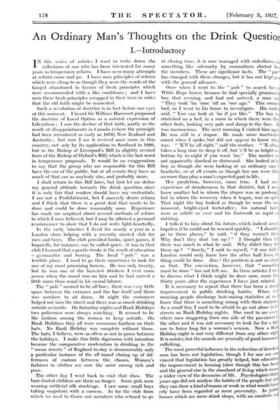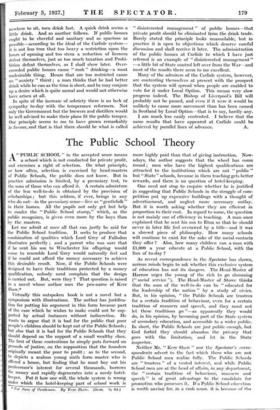An Ordinary Man's Thoughts on the Drink Questio u
I.—Introductory
IN this series of articles I want to write down the reflections of one who has been interested for many years in temperance reform. I have seen many attempts at reform come and go. I have seen principles of reform which were dung to as though they were the words of the Gospel abandoned in favour of fresh principles which were recommended with a like confidence ; and I have seen these fresh principles scrapped in their turn in order that the old faith might be reasserted.
Such a revolution of doctrine is in fact before our eyes at this moment. I heard Sir William Harcourt propound the doctrine of Local Option as a natural expression of Liberalism ; I saw the decline of that faith, partly as the result of disappointments in Canada (where the principle had been introduced as early as 1878) New Zealand and Australia ; but now I see it revived once more in this country, not only by its application to Scotland in 1920, but in the Bishop of Liverpool's Bill (a slightly revised form of the Bishop of Oxford's Bill) which is the last word in temperance proposals. It would be an exaggeration to say that the group who are responsible for this Bill have the car of the public, but at all events they have as much of that ear as anybody else, and probably more.
I shall return to this Bill later, but first Jet me define my general attitude towards the drink question, since it is only fair that readers should have my credentials.
I am not a Prohibitionist, but I sincerely desire reform and I think that there is a great deal that needs to be done and could be done reasonably soon. Experience has made Inc sceptical about several methods of refomi in which I once believed, but I may be allowed a personal reminiscence to show that I do not write light-heartedly.
In the early 'nineties I lived for nearly a year in a London slum helping with a recently started club for men and boys. The club provided books, quiet games, if bagatelle, for instance, can be called quiet—it was in that dub I learned that a gentle stroke is the result of education — gymnastics and boxing. The local " pub " was a terrible place. I used to go there sometimes to look for one of my most .promising boxers. He was only twenty, but he was one of the heaviest drinkers I ever came across when the mood was on him and he had earned a 'little more than usual in his casual labour.
The " pub " seemed to be all bar ; there was very little space between the entrance and the bar itself and there was nowhere to sit down. At night the customers bulged out into the street and there was as much drinking outside as inside. On Saturday nights and Bank Holidays two policemen were always watching. It seemed to be the fashion among the women to keep outside. On Bank Holidays_ they all wore .enormous feathers. on their hats. No Bank Holiday was complete without those.
The hats, I believe, were as often as not in pawn between the holidays. I make. this little digression with intention because the comparative moderation in drinking in the "mean streets" of England to-day is demonstrably only a particular instance of the all round closing up of .dif- ferences of custom between the, classes. Women's fashions in clothes are now the same among rich and poor.
The other day I went back to visit that .sluin. The bare-footed children are there no longer. Some girls were wearing artificial silk stockings. I saw some small boys taking -snapshots with a camera. 'As for the club from which we Used to throw out members- Who refused to go • at closing time, it is now managed With orderliness an something like solemnity by committees elected 'fru • the members. These are significant facts. The" pub - has chang&I with these changes, but it has not kept pa( --with the general advance.
Once when I went to the "pub " to search for al. White Hope boxer, because he had specially promised box that evening, and had not arrived, a 'Man sal "They took 'mm 'ome an 'our ago." This sounded 'bad, so I went to his -home to investigate. His moth- said, " You can look at 'im if yer like." The boy was stretched' on a bed, in' a room in which there were Um other beds, looking very pale and damp in the face. II was unconscious. The next morning I visited hint again He was still in a stupor. He made sonic inarticulate sound when I spoke, but did not appear to know who was. " 'E'll be all right," said the mother. " 'E alwav takes a long time to sleep it off, but 'ell be as bright as a button by to-night if you want 'im." The mother sea not apparently shocked or distressed.. She looked at lie boy as though she were looking at an ordinary case a headache, or at all events as though her son were doill no more than play a man's expected part in life. - Her prediction, however, came true. I had ma experience of drunkenness in that district, but I never knew another lad in whom the stupor was so proloi but in whom the recovery when it began, was so quid. That night the boy looked as though he were the ni innocent, bright-eyed teetotaller ; his natural tactic were as subtle as ever and his footwork as rapid an untiring.
I talked to him about his future, which indeed seenad hopeless if he could -not be rescued quickly. "I shoal]. . go to those places," he said, "if they weren't timer Why don't they shut 'cm up ? " I thought then tha there was much in what- he said. Why didn't they sl them up ? " Surely," I said to myself, "- if one half London would only learn how the other half lives, ti thing could be done. Alas ! the problem is not so simp as that. The conviction, however, that " somethin must be done" has not left me. In these articles I- want to discuss what I think might be done now, more Oa thirty years after the experience I have just related.
It is necessary to repeat that there has been a stead?
improvement in public drinking habits. When well' meaning people discharge hair-raising statistics at use I know that there is something wrong with their statistic. -As a small boy I used to be afraid to go out alone in tilt streets on Bank Holiday nights. One used to see ever -where men staggering from one side of the pavement to the other and it was not necessary to look far for a fight nor to listen long for a woman's. scream. - Now a Bank Holiday night is not very different from any other night. It is noisier, but the sounds are generally of good humoured rollicking. The most powerful influence in the reduction of drunken' ness has been not legislation, though I for one am con• 'winced that legislation has -greatly helped, but education, the improvement in housing (slow though this has been) and the general rise in the standard of living which means a wider view of the decencies of life. Psychologists thirtY years ago did not analyse the habits of the people, but nosi they can show a kind of reason at work in what would forn erly have been regarded as mere perversity. In publ. houses which ore mere drink shops., with no comforts an nowhere to sit, men drink fast. A quick drink seems a little drink. And so another follows. If public houses ought to be cheerful. and Sanitary - and as spacious as possible—according to the ideal of the Carlisle system— it is not less true that too heavy a restriction upon the hours of opening and too stern a reduction of licences defeat themselves, just as too much taxation and Prohi- bition defeat themselves, as I shall show later. Over- crowded public houses cause " rush " drinking—a most undesirable thing. Hours that are too restricted cause an " anxiety " thirst ; a man thinks that he had better drink while he can as the time is short, and he may conjure up a desire which is quite unreal and would not otherwise have arisen at all.
In spite of the increase of sobriety there is no lack of sympathy to-day with the temperance reformers. Not only the Government but the brewers and distillers would be well advised to make their plans fit the public temper. One principle seems to me to have grown remarkably in favour, and that is that there should be what is called "disinterested management" of public houses—that private profit should be eliminated fram the drink trade. Barely stated the principle looks unassailable, but in practice it is open to objections which deserve careful discussion and shall receive it later. The administration of the public houses at Carlisle to which I have just referred is an example of "disinterested management" —a little bit of State control left over from the War—and most of the results there seem to me excellent.
Many of the admirers of the Carlisle system, however, are contenting themselves at present with the prospect that the system will spread when people are enabled to vote for it under Local Option. This means very slow progress indeed. The Bishop of Liverpool's Bill will probably not be passed, and even if it were it would be unlikely to cause more movement than has been caused in Scotland by Local Option—that is to say, hardly any.
.I am much less easily contented. I believe that the same results that have appeared at Carlisle could be achieved• by parallel lines of advance. A.



























































 Previous page
Previous page